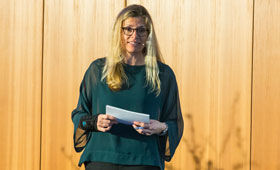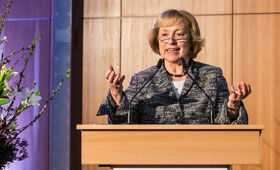Federal Government expands international cooperation in vocational education and training
On 22 March in Berlin, the German Federal Government arrived at a positive assessment of their international involvement in vocational education and training cooperation. At the conference organised by the BIBB/GOVET for the review of international involvement, government departments discussed the successes and challenges faced over the course of their activities abroad with the press and a specialist audience.
_280x170_rdax_80p.jpg)
The conference organised by GOVET at BIBB on 22 March 2017 in Berlin for the review of international involvement was entitled “Strengthening vocational education and training, creating opportunities — the international involvement of the Federal Government”. It has been almost four years since the German Federal Government adopted the Strategy of the Federal Government for Cooperation in Vocational Education and Training from a Single Source. It forms the framework which enables potential for synergies to be identified at an early stage and within which the numerous activities can be coordinated with one another — in particular with regard to the demand from partners abroad. More than 150 representatives of international cooperation in vocational education and training came together in Berlin to take stock. Together they discussed the extent to which the strategy had been implemented and how international cooperation in vocational education and training should be further developed.
_rdax_80p.jpg)
It became clear that vocational education and training is becoming increasingly important and that Germany’s involvement is worldwide. German government departments work together in this area. However, the strategy’s continued development will be a fundamental factor in the success of the future collaboration. The German government departments introduced the contextual focus for this as part of the conference.
The Federal Ministry of Education and Research (BMBF) and the Federal Ministry for Economic Affairs and Energy (BMWi) are responsible for vocational education and training in Germany. They also apply their expertise abroad. They provide advice and support to other countries on the development of sustainable vocational education and training. As part of the development collaboration, the Federal Ministry of Economic Cooperation and Development (BMZ) has projects in many countries that strengthen vocational education and training. The Foreign Office is the first point of contact abroad for matters concerning collaboration in vocational education and training with Germany.
The event was opened with keynote addresses by Dr. Georg Schütte, Secretary of State in the Federal Ministry of Education and Research (BMBF), Prof. Dr. Maria Böhmer, Minister of State at the Foreign Office, Dirk Wiese, Parliamentary State Secretary of the Federal Ministry for Economic Affairs and Energy, (BMWi), and Hans-Peter Baur, Ministerial Counsellor in the Federal Ministry of Economic Cooperation and Development (BMZ). “We advise nations both within and outside Europe not only on how vocational education and training can take place in schools but also in companies,” explained Dr. Georg Schütte of the BMBF. He emphasized that this required structural changes to systems and long-term partnerships with the relevant government offices abroad.
Minister of State Maria Böhmer of the Foreign Office was very positive in her overall assessment of the cooperation between the government departments responsible. She explained that momentum behind cooperation in vocational education and training had increased significantly and that this was helped a lot by coordinated initiatives “from a single source” . In her view, there should be even greater focus on two issues in future. On the one hand, measures from largely individual projects should be transferred into structures set up for the long term. On the other, more should be done in the countries for the image of dual vocational education and training. She added that, in many countries, dual education and training did not yet have the same status as academic study.
“The economy needs qualified skilled workers. We are therefore committed to using our global network of chambers of foreign trade to support our participation in VET collaboration. We use ‘skills experts’ to provide support to German and local companies with company-based training of young people at a local level to meet demand,” explained Dirk Weise from the BMWi.
Hans-Peter Baur of the BMZ emphasised the role of Germany in vocational education and training adding that, globally, Germany was the largest bilateral VET provider. He explained that just the BMZ alone cooperates with more than 60 partner countries and reaches approximately 1.8 million people with its activities. He added that, in addition to achieving the global sustainable development goals in which the vocational education and training of women plays an important role, vocational education and training will be expanded in the future in all BMZ activities.
GOVET organised the conference on behalf of the Federal Government under the auspices of the Federal Ministry of Education and Research (BMBF). GOVET was established based on the strategic paper of the Federal Government on cooperation in vocational education and training from a single source. GOVET’s role includes the provision of advice and information to stakeholders involved in VET collaboration. GOVET brings together German stakeholders involved in VET cooperation at the Round Table and creates a platform for networking and for the exchange of ideas and views. A further core task of GOVET is the provision of specialist guidance in the bilateral VET cooperations of the BMBF.
_rdax_80p.jpg)
Examples of collaboration in vocational education and training from practitioners based in Italy, Mexico, Slovakia and South Africa provided participants with an insight into practice. The challenges taken on in recent years by German stakeholders together with their partner countries vary substantially. A joint approach by stakeholders is important in all cooperative arrangements. Viktor Elbling, German ambassador in Mexico, presented the cooperative arrangement with Mexico emphasizing that “we are only strong when we work together”. Elbling cited several reasons for the success of the cooperation between Germany and Mexico. One key to the success of the collaboration, for example, was the Round Table at the German Embassy at which the course of action adopted by German stakeholders is coordinated and agreed upon on a regular basis. He added that, further to this, close collaboration with Mexican business and with Mexican social partners was equally important.

In the subsequent panel discussion on the overseas cooperation of German organisations, practitioners involved in international cooperation in vocational education and training had the opportunity to comment. Representatives of vocational education and training policymaking, international organisations, German unions and German business associations discussed the successes and challenges to date and considered the future of the joint involvement.
The panellists emphasized that the exchange with German stakeholders working in this country is critical to the success in a partner country. They added that only in this way was it possible to learn from the experiences of others and to pool competencies. It was pointed out that, as the central point of contact for international vocational education and training cooperation, GOVET assumes an important guiding role in this.
In many countries, international collaboration in vocational education and training has already produced successful pilot projects. It was noted that overarching structures now had to be arrived at on the basis of these projects and that individual solutions in the partner countries were important in this. Each country and each region has different basic requirements and underlying circumstances. In order to promote vocational education and training, it is necessary to use the opportunities provided by existing structures together with the partner countries.
However, the image problem was identified as a major challenge. Panellists pointed out that in many countries the image of dual vocational education and training was not good. Many young people decide against vocational education and training in favour of a university degree. It was identified, in this respect, that young people needed convincing. The benefits of dual vocational education and training should be highlighted to these young people, to their parents and companies.
One thing is clear — in order to address these challenges the solution in future will also be to develop approaches for change together and to implement these jointly. This was emphasized in the closing remarks by Volker Rieke, head of the department for European and international cooperation at the German Federal Ministry of Education and Research. He also underlined impetus for the future which might be taken from the discussions over the course of the conference.

_rdax_80p.jpg)
_rdax_80p.jpg)
_rdax_80p.jpg)
_rdax_80p.jpg)
_rdax_80p.jpg)